 In my June blog post I talked about finding your flower – that special something which brightens your day and brings joy to your life. I also talked about freedom – how we take it for granted until we don’t have it any more. The other strange thing about freedom is that, as a concept, it doesn’t exist on its own. If you have freedom it either means you are free to do something or go somewhere – or it means you’re free from something or somewhere. Freedom to…or freedom from. Freedom from has harsher overtones. It implies that a person has formally not had freedom – that they were in some way imprisoned. This might not mean imprisonment in the strictest sense – a small cell, a miniscule window, locked doors and scary fellow inmates. It could mean being unable to make one’s own choices due to the obligations, expectations and limitations of others…or by one’s own bodily or financial restrictions. To be suddenly free from such strictures sounds wonderful – like a dove being released into a clear blue sky. Thus, freedom from leads to freedom to. But what then? Once a person has freedom, what are they going to do with it? Where are they going to fly? One of my characters, in the novelThe Bell Curve, has this very problem. Margaret has been a stay-at-home mother so long she almost become institutionalised. So when her youngest starts showing definite signs of no longer needing her as he once has, Margaret is lost. She sees that she has the freedom to now choose her future but does not know what she wants to do – or even what she is capable of doing. But freedom is a precious gift. If we have it, we all ought to be thinking about how we can use it to lead interesting and fulfilled lives – and how we can make the lives of others richer in the process. If you want to check out what happened to Margaret, check out The Bell Curve here.
0 Comments
 I’ve always been a fan of jigsaws. There’s something so satisfying about taking all of those little pieces and putting them together to form a picture. And for me, the harder the better – giant jigsaws, mirror jigsaws, mystery jigsaws, jigsaws with no guiding picture. Bring it on! However, it’s years since I’ve indulged my passion for that particular type of puzzle. For a start they require undisturbed space, something in scant supply in a house where autism resides. They suck up time, pulling me in like an irresistible magnet. And once you’ve done them you break them up and they sit languishing in a cupboard somewhere, taking up valuable real estate. Lately, though, I have dipped my toe back in the jigsaw waters by completing some online. It’s a tidy way to do them – no issues with boxes and missing pieces and having to keep them away from disturbing influences. The pull to do just a few more pieces still remains, but all in all, it’s a great alternative. Perhaps it’s this reacquaintance with the small piece puzzle format that made me mention it when talking to a friend. I made the remark that life is like a jigsaw: we put together the picture of our life one piece at a time. Sometimes it can take a while to work out where the pieces go. Occasionally we feel like there are pieces missing. It takes time for the image to start to emerge but it feels so satisfying when a few pieces or a hard section suddenly comes together. I also realised another parallel, and that comes in the fact that big pictures come together in small pieces. I’m a big advocate of breaking tasks down into smaller pieces, in not getting overwhelmed with all that it might take to get to the finished product. I often see my students become overwhelmed in the face of having to complete assignments. They look at any given task as though it’s Mount Everest and think to themselves, “I can’t do that.” Instead, I encourage them to break things down into small pieces. Let’s start by packing your bag for Nepal. Let’s get you on the plane to Kathmandu. Then let’s get you to base camp and start the climb step by step. It often surprises them at how a seemingly insurmountable task becomes manageable. It seems the humble jigsaw has a lot to teach us about the nature of life. As for me, I might just get back to putting in a few more pieces… 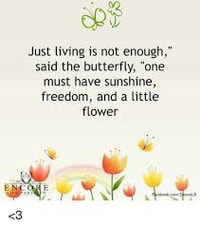 At times throughout my previous blog posts I have mentioned quotes I find inspirational. It’s funny in a way, because I don’t consider myself to be a “quoty” person – someone who seeks out such short, pithy statements as a means to inspire their life. But somehow quotes seem to have a way of finding me whether I’m looking for them or not. One of my favourite quotes is this: What Hans Christian Anderson really meant by these words could be debated. You could think he means these things literally or you could think he means these things metaphorically. For me, I think it’s a little of both. Scientists will expound on the virtues of sunshine in safe proportions. From it we obtain vitamin D, an important compound that regulates our absorption of calcium and phosphorous that helps keep our bones strong. It facilitates normal immune system function. It also fights disease, reduces depression and boosts weight loss. That’s quite a list. But perhaps what Anderson meant was that we all need something warm in our life – be it people or family or love – or even a good book! Freedom is strange. It’s something we take completely for granted until such time as we don’t have it any more. Suddenly we miss its absence with a sharp intensity, thinking back to better days when freedom was our silent friend. We have some experience of this in our family as we support our son through the pleasures and pitfalls of autism. We have chosen to do our utmost for him but as a result we have not had much time off. In fact we recently had off only our fifth overnight stay in eighteen and a half years – or as I calculated, approximately 6,750 days. I think Anderson is right in his assertion that we need freedom – but what that looks like for me is not the same as what it will look like for you. Whatever the case, treasure it while you have it. It really helps you to not just live but to flourish. Lastly, we come to the little flower. Personally, I love to be given flowers, but again I don’t think this is what Anderson meant. I think he’s talking about something that is simple and yet complex. Something that is beautiful and special. Something that can be given and received. And again, this will be different for all of us. What is your “flower”? That thing that makes your face light up, that you can share with others so that it brightens their day? Something that gives you pure but simple joy? For me, I think my life consists of lots of different flowers, including friends and family. However, one of the key delights has to be writing. Even the sort of business writing I do these days, where I’m writing about ropes or finances or sales or interior design or health and safety, makes me feel happy in the same way a flower might bring delight. What about you? What’s your flower? If you don’t know, now might be a good time to stop and smell the roses. As some of you may know, when I’m not writing I also tutor high school students in English. I currently have a fabulous bunch of students, most of whom have been with me for some time now. The focus of our time together is for me to help them understand the internal assessments they’re assigned, then help them make a plan for how to tackle the assessment before they go off and write it. After writing, we get together to look at their draft and I teach them how to refine and edit.
We also spend some time looking at the base material they’re working off – essentially books, movies and poems – and talk about the themes and meanings that those works contain. As part of this, we often end up talking about setting. It’s easy to regard setting as something akin to wallpaper. It’s there in the background to enhance the story. The amount an author uses it is sometimes genre dependent. For instance, historical novels tend to be rich in setting details because those setting details help readers picture the past more clearly. Fantasy writers create fictional settings so need to supply plenty of information for readers to picture environments that otherwise don’t exist. Thriller writers often use it in briefer ways, telling the reader only what they need to know to give context as their protagonist speeds his way through the setting in pursuit of his quarry. Regardless, what I try to get my students to understand is that setting really does matter. Setting influences us in everyday life much more than we give it credit. Where you are born and when you were born have huge implications for your life: socio-economic, political, educational, health, physical and even nutritional implications. It influences your outlook, your choices and your prospects. My novels all use New Zealand as the backdrop for the events that take place. I tend to use fictitious settings within New Zealand because many of our real-life towns and cities have distinctive reasons for being and origins that often have Maori ties. My novels are not about those things but about the essence of human nature and behaviour, particularly in groups. Instead, I use the flavour of New Zealand to enhance the story. My most “New Zealand” novel is The Journey, a story about a group of people who come together for a two-week walking trip through New Zealand wine country. Many people tell me how much they enjoyed reading the scenic aspects of the novel – but even more tell me about how much they loved the characters and their take on life – characters that are in turn influenced by the setting. I am blessed to live in a little slice of paradise and am truly grateful for my own setting. Like all places in the world it is not without problems but, as I often remark to my husband as we drive across the sparkling waters of Waitemata Harbour into the city, there sure are worse places to live. And hopefully, in the future, my setting will inspire yet more novels for fans to enjoy. I read an interesting statistic last week. It stated that 79% of consumers trust online reviews and testimonials just as much as personal recommendations from their peers. This essentially means that four out of five people will believe an online review pretty much without question. That’s a high amount.
Yet it probably shouldn’t have come as much of a surprise. If I’m thinking of booking a hotel or a table at a restaurant (which isn’t often!) I will look at online reviews before I take the plunge. And while some reviews are quite obviously written by people with axes to grind – or who generally have a hard time being happy – the majority of reviewers seem to be stating things as they see them. Sometimes those observations make me change my mind, both for better and for worse. As for giving reviews, I’m a Level 6 contributor on Trip Advisor (which essentially means I take the time to review pretty much any place I go, stay or eat at), a process I enjoy not only because you know your comments could help someone else, but also – mostly – to give praise where praise is due. I generally don’t review products and I definitely don’t review books. This might sound strange coming from someone with at least a few clues about what it takes to write a novel, but reviewing other authors’ works just doesn’t seem quite right to me. After all, I’d never review the work of a colleague (not formally, anyhow!) or comment on the outpourings of a friend (unless they asked me to) and reviewing books by other authors seems much the same to me. But there’s no doubt that we authors want reviews and, given the above statistic, need reviews. Obviously, the more favourable a review the better, but nevertheless, whether good or bad, reviews matter. So, if you want to help an author out, making a review is a great way to go about it. Not only does it contribute to the weight of social proof, it could very well make an author’s day. Happy reading…and reviewing! I have recently started a new freelance job working as a Content Strategist. What is that, I hear you ask? Well, in simple terms, it is someone who helps small to medium sized businesses come up with a strategy of how to better communication with their clients by finding ways that add value to the lives of those clients. For instance, a hairdresser might supply content on how to prevent split ends or how to take care of coloured hair or how to style their hair in a different way. My new job involves helping clients first get their brand wording right, aligning this with their website and then coming up with ideas of how to add that value over time.
It’s fair to say that this new job, along with my other roles, is keeping me away from any more novel writing for now. And while it makes me a little wistful to be temporarily out of the zone of writing novels, having a new challenge has its advantages. For a start, I am being exposed to snippets of other people’s worlds that I wouldn’t normally see. My two clients so far have been a mortgage broker and an interior designer. It’s interesting to hear their stories and see their passion and learn new things. In fact, these early stages of my new role have given me the chance to learn many new things as well as to use my skills in a new realm. I also get to see learning in action through my high school English tutoring. Watching my students discover new things about the world in which they live and about themselves is a delight and privilege. As they are exposed to literature about other times and places and people, it’s great to see them use that knowledge to not only do well with their course work, but also to gain a greater appreciation for the benefits of modern living in beautiful, peaceful New Zealand. I’m really on board with the concept of life-long learning. I love the idea of continuing to challenge my synapses, expand my knowledge and keep growing as a person. I’m glad for the fact that there’s a world of things to discover and understand (although I freely admit that many – like maths – are way beyond fathoming in my humble opinion!). So, for now, I am embracing my new opportunity to keep on learning…and I guess, in time, I will see where it takes me! Back in my day, Year Books weren’t a standard part of New Zealand high schools, although this has since changed and they're now quite commonplace. Perhaps one influencing factor for this is the amount of times they are referred to in modern American movies. And while I might not have ever seen a U.S. example, I am aware of at least one aspect of them: the “Most likely to…” quote. Here’s the sort of thing that’s said about students:
Most likely to start a band Most likely to become President Most likely to travel the world Most likely to start their own business Most likely to cure cancer Most likely to become a ninja Most likely to be late to their own funeral Most likely to win a Nobel Peace Prize/Pulitzer/Oscar If I’d had one, mine would have said, “Most likely never to own a dog.” I didn’t grow up around dogs, am allergic to dogs and always felt a little wary of dogs. We heard, however, of some anecdotal evidence to suggest that dogs are good for kids with autism. That made me feel a little tempted to consider the idea…but, really, a dog? I don’t think so! Then I happened to be on a school trip with my daughter about eleven years ago. While we were out exploring I saw a small and extremely cute dog and for the first time ever thought to myself, “I could take that dog home.” I didn’t recognise the breed, except that it looked like a baby greyhound. On investigation, I discovered it to be an Italian Greyhound (also known as Egyptian Mouse Hounds). Italian Greyhounds aren’t very common in New Zealand but we found a breeder, waited patiently, and eventually ended up with one of our own who we named Oscar. Oscar turned ten this month. His name means “divine spear” and this seems so fitting – a divine gift who not only looks like an arrow, he acts like one too. He’s shot his way through our family in such a way that the novelty of having him around hasn’t ever worn off. He’s been fabulous for my son – and fabulous for all of us. And because I’m inevitably the one that looks after him, feeds him and walks him, he’s become like my little shadow. He’s a constant presence in my life when I’m home and keeps me company while I write. In fact he's with me now as I write this post. It’s fair to say that I’ve gone from dog avoider to dog lover. So have I turned into a crazy dog lady? Most likely! 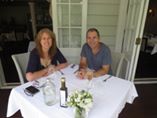 As usual the year has started with a gallop and the end of January has arrived. According to statisticbrain.com, 58.4% of those who made a New Year’s Resolution will already have given up on their goal. As someone who doesn’t make any to start with, I can happily say I’m unaffected by this statistic. Here in New Zealand it’s summer. Being an island nation at the bottom of a vast and sometimes tumultuous ocean, this means not being certain of whether our weather might be good, bad or indifferent.. Some years we have good summers. Other years we are plagued by cyclones or wind or changeable conditions with cloud, rain and sun all taking turns in any given day to despair or delight. I’m pleased to report that this summer has given us a good range of favourable days and record hot temperatures – hopefully a phenomenon caused by nature rather than climate change. Over the summer our family have had what might best be termed a staycation. We’ve pottered about the city, made use of the back-yard hammock and had the odd beach visit or two. One exception to this city-based summer came just two weekends ago when my husband (Paul) and I headed south for the day as part of our 28th wedding anniversary celebrations. We enjoyed a great lunch at a beautiful restaurant on an olive estate before going on to Hobbiton to do the movie set tour from the Lord of the Rings films. It proved to be a delightful way to celebrate our wedding anniversary. Statistic-wise, and depending on your country of residence, the divorce rate is anything between 33 – 50%. This figure changes markedly for parents of special needs children, with a whopping 80% of marriages not standing the test of time – or, more accurately, the test of caring for a small person with big needs. As a couple in this latter bracket we can also say that, to date, we're also happily unaffected by this statistic, I can only reflect on what might have helped keep us strong. Because, at the end of the day, we have no magic answers or superpowers. After pondering this, I can only conclude it’s team work, a common purpose, hard work and a good sense of humour. Oh, and good, old fashioned love, of course. This all makes me wonder, if I had to make a resolution from here, what would it be? After yet more pondering I conclude it's this: To keep smiling, keep striving, keep hopeful…and keep writing! I feel quite resolute about that. How about you? Have you ever heard of Orison Swett Marden? I’ll confess I had not. Upon consulting Uncle Google I discovered he was born in 1848 in a place called Thornton Gore, New Hampshire, a place so humble it is no more. Three years after his birth, Orison’s mother died. Another four years after that, his father also died as the result of an accident. Thus, at the tender age of seven, Orison became an orphan.
Shortly thereafter Orison’s childhood appeared to be over as he became a “hired boy” working for a number of families in exchange for his keep. Most of us in the western world in this day and age find it difficult to imagine a seven- year old having to get out and work. Most of us will attest that’s it’s pretty difficult to get the modern seven-year old off the computer let alone having to labour day in and day out. I suppose such an experience could have defined Orison – and not in a good way. He could have been bitter and resentful for the hand life dealt him. At the very least he could easily have faded into obscurity. Yet Orison was not destined to merely remain a farm hand. In fact the fountain of all knowledge, Wikipedia, notes, “Marden’s young manhood was marked by remarkable energy and unbroken achievement.” We learn that, by his early thirties, Orison had undertaken university studies in the areas of science, arts, medicine and law before going into the hotel business. Why, I hear you ask, the interest in Mr. O. S. Marden? Because I came across this quote from him: "Deep within you dwell those slumbering powers; forces that would revolutionise your life if aroused and put into action." This thought quite grabbed me, not least because most of us, if expecting some sort of revolution, figure such radical change will come from external sources. The Cinderella-waiting-for-someone-to-come-and-set-her-free scenario springs to mind. Yet Orison Marden thought otherwise. He raises the theory that revolution comes from within and all that’s required is to arouse those “slumbering powers” hidden deeps within us. Interesting. On reading more about O.S.M. I discovered that, as a teenager, he’d been inspired by the writings of Scottish author Samuel Smiles. This jovial sounding man had written (and self-published) a book called Self Help that extolled the virtues of hard work, thrift and perseverance. Marden took these principles to heart and applied them to his own life. It clearly helped him push on through several failed businesses. It perhaps also helped him recover from the setback of narrowly escaping a hotel fire in nothing but his nightshirt, in which he lost over 5,000 pages of manuscripts. The loss of all that work also did not deter. In fact O.S.M went on to write over fifty books and leaflets and to found SUCCESS magazine, a publication that still exists to this day, albeit in digital form. His book Pushing to the Front (1894) helped inspire people such as Theodore Roosevelt, William Gladstone, Henry Ford and Thomas Edison. He’s considered to be something of a founding father in the field of self-help and motivation. And my point? Perhaps it lies in this question: what are your slumbering powers? And how, as we sit on the eve of a new year, do each of us wake these powers up and start a revolution – to effectively make our lives count while we live and breathe? I admit to not having read Pushing to the Front to find out. But perhaps a clue lies in a quote from another famous author, Ralph Waldo Emerson, who says: "To accomplish excellence or anything outstanding, you must listen to that whisper which is heard by you alone." So as 2018 arrives let me encourage you to take some time to listen out for whispers. I know I will be. And, in doing so, who knows? We might just start a revolution. 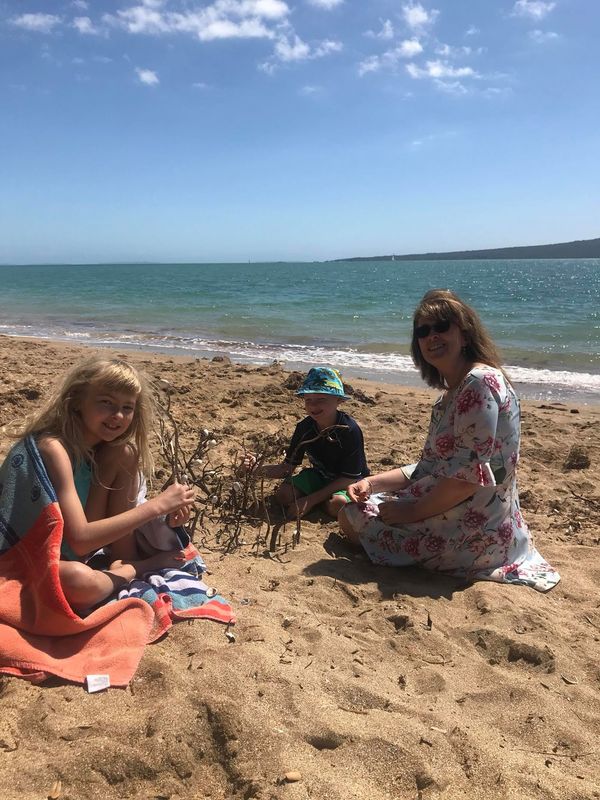 Auntie heaven! Auntie heaven! It’s fair to say I come from a pretty small family – and what family I do have are not local. My brother, his wife and children live in the US and my cousins are in Australia, the US and in the South Island of New Zealand. My hubby comes from a bigger family but they are all on the other side of the planet in the UK. And while it is doubtless a much smaller small world than it used to be with modern travel and communication technology, there’s still no substitute for being able to get together – and not just on high days and holidays. This was brought home to me just recently as my brother and his family came to visit. His children are six and eight, full of that delicious promise of youth, brimming with wide-eyed enthusiasm and utterly delightful. For one glorious week I found myself in Auntie heaven, making sandcastles, looking in rock pools and watching the two of them bond with my two children. It was a very special time. It was also extremely hard to say goodbye, not knowing when we will see them again. That small world that everyone talks about just isn’t quite small enough for my liking. I’ve also been reflecting on how much I love my own family – how proud I am of my children, how I enjoy watching them grow and develop and face life’s challenges with courage and determination. I would quite literally do anything for them. I’ve come to a conclusion that, in a strange way, that distance – that separation – that lies between us does make me feel an enormous gratitude for all of my family near and far and for the times we do get to spend together. I feel I’m in no danger of taking them for granted or not appreciating their specialness. Perhaps some of this is reflected in my writing, in the way that I like to bring groups of people together as I tell my stories. Things don’t always go smoothly (I’m not totally living in a fool’s paradise!) but forged bonds and connections are ultimately where most of my novels end. So I encourage you to take a fresh look at your family, to hug them and accept them with all their faults and foibles. Because, at the end of the day, family are the most precious gift we have – and ultimately, everything is about our love of family. Go well. |
Author's BlogComing soon. . . Archives
June 2019
Categories |

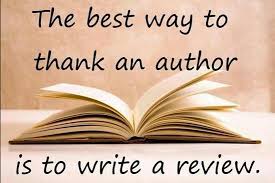

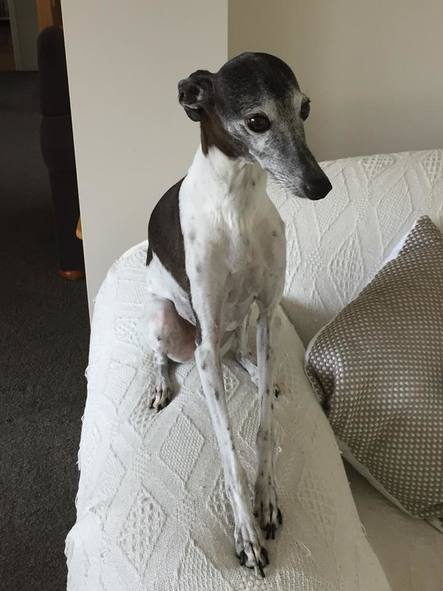

 RSS Feed
RSS Feed